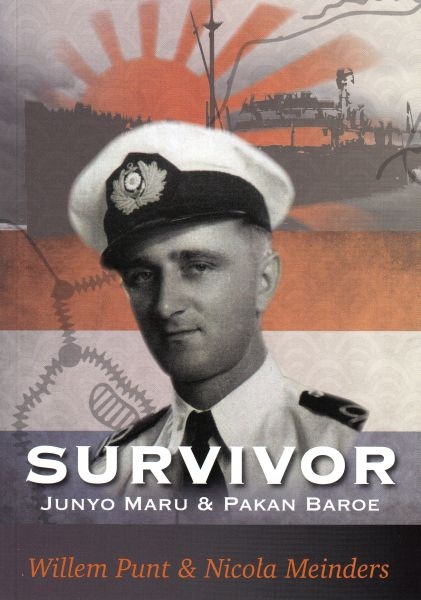| Title: | Survivor - Junyo Maru & Pekanbaru |
| Writer: | Meinders, N. & Punt, W. |
| Published in: | 2019 |
| ISBN: | 9789090333212 |
| Description: | Willem Punt (born 1921) first shipped out on a Dutch merchant ship when he was fifteen. Like many young boys from IJmuiden, he did it to help support his family. After the Second World War broke out in Europe, he experienced a few crossings across the Atlantic Ocean, where German submarines caused death and destruction. Some time later he ended up in the Dutch East-Indies. After the Netherlands declared war on Japan on 8 December 1941, Willem was put to work in the Royal Netherlands Navy but was taken prisoner early 1942. Subsequently, he was held in several prisoner-of-war camps by the Japanese occupier of the Dutch colony. The Japanese needed workers for the construction of railways and roads in the countries and areas they occupied. They forced Asian men and boys from the occupied lands into slave labour. These "romusha" (the Japanese word for labourer, now used to mean specifically the forced laborers in World War II) were the primary source of construction labour. From 1944 on, the Japanese needed more labourers, and that’s why they took prisoners of war from their camps and transported them to places where the war infrastructure needed to be expanded, such as the construction of a railway on Sumatra. Willem Punt ended up on the transport ship Junyo Maru together with 4,200 romusha and 2,200 American, British, Australian, but predominantly Dutch prisoners of war. These kinds of transport ships were called ‘hell ships’ because the conditions on the old rust buckets were inhumane. The already malnourished and weak forced labourers were violently pushed into the holds, without food, drink or medical care. Many died even before the ship set sail for Sumatra from Tandjong Priok, the port of Batavia, Java. In addition to the hardships on board, the prisoners were also exposed to the risk of their hell ship being torpedoed by Allied submarines. Recently released war documents show that, by cracking the Japanese codes, the Allied commanders-in-chief were aware very early of the fact that the Japanese were using unmarked ships for prisoner transports. They were even aware of the positions of the ships and which routes they would take. However, this information was deliberately not shared with the commanders of the submarines, so that the information that the maritime codes were cracked would not leak. Moreover, the loss of equipment by the Japanese and the disruption of their strategic flow of goods were more important than the loss of their own Allied manpower, who were simply sacrificed. Because of this Allied point of view, the Junyo Maru, too, did not escape being torpedoed. Twenty miles off the coast of Sumatra, on 18 September 1944, the ship was attacked by the British submarine HMS Tradewind and was hit by 2 of 4 fired torpedoes. The ship sank within 20 minutes. Out of 6,520 passengers on the Junyo Maru, 5,640 died, among them mostly romusha who couldn't swim. The 680 survivors that were prisoners of war were still put to work constructing the Pekanbaru railway, which was going to connect West Sumatra with East Sumatra. During the construction of this railway, 82,500 forced labourers died of malnourishment, exhaustion, abuse, and tropical diseases. Willem Punt also survived this ordeal, together with about 100 other survivors of the Junyo Maru disaster. Willem Punt only started to tell the stories about the Junyo Maru and the Pekanbaru railway at a later age. This is because the memories and the nightmares were too fresh and too painful, but especially because of the reactions he received when he talked about having been in Asia during the Second World War. Many Dutch people thought he had it easy in the tropical heat, while they had to endure the cold winters. Survivor is co-written by Willem Punt’s granddaughter by marriage, Nicola Meinders. He already had his story partially written down once, and parts of his story are included in the books of author Henk Hovinga: "Eindstation Pakan Baroe 1943-1945" and "Dodenspoorweg door het oerwoud". Moreover, in 2003 he cooperated on an episode of the television programme, "Andere Tijden" about the Junyo Maru (https://www.anderetijden.nl/aflevering/515/De-ondergang-van-de-Junyo-Maru). Nevertheless, he told his granddaughter that it was a shame that his story was not complete. He wanted to have it written down in its entirety. That would paint a realistic picture of what he had to endure instead of just the highlights. He dictated the full story by heart to his granddaughter, who wrote it down using previous notes. This showed that Willem, despite being 97 years old, still had an excellent memory. Nicola Meinders made sure that how Willem Punt told his story remained intact in the book, which also improves its authenticity. Survivor basically describes the ultimate pointlessness of war. The British commander of HMS Tradewind didn’t know until decades after the torpedoing of the Junyo Maru that it was a hell ship and that it was packed with Allied forced labourers. For him, the ship was just a freighter used by the Japanese, and he did what his High Command told him to do. After Willem Punt endured this hell, he was put to work on constructing a railway that cost tens of thousands of deaths, but was never used. Luckily the story of Willem Punt is not pointless. It is very important even that it is finally written down by perhaps the last survivor of both the sinking of the Junyo Maru and the construction of the Pekanbaru railway. Nicola Meinders expresses hope that Grandpa Wim’s story helps people understand what cruelties prisoners of war and romusha had to endure. In addition, she hopes to offer comfort and support to families that suffered similar tragedies in their history. Survivor is not a relaxing book to read; too much human suffering is described. The suffering might come as a surprise to the reader, because Willem Punt did not mince his words. And that is very good, because not only will the story help others that are involved understand and offer comfort and support to families, but also it will help many readers to put things into perspective and to reflect. |
| Rating: |     Very good! Very good! |
Information
- Translated by:
- Barbara Keus
- Article by:
- Peter Kimenai
- Published on:
- 21-07-2020
- Feedback?
- Send it!



